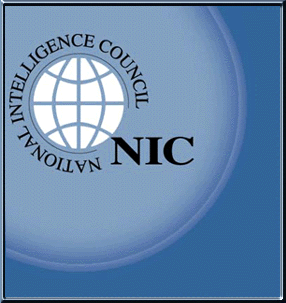 What a difference four years make--or is it merely an ideological shift? The National Intelligence Council has been doing, every few years, projections of global trends for 2010, 2015, 2020 and, just recently (November, 2008) 2025. Four years ago, the NIC scenarios saw globalization as irreversible; looked to an on-going and unchallenged American economic and military supremacy; saw energy supplies as plentiful. In 2004, the NIC projections for 2020 did not even mention global climate change. Terrorism was the main focus in that report.
What a difference four years make--or is it merely an ideological shift? The National Intelligence Council has been doing, every few years, projections of global trends for 2010, 2015, 2020 and, just recently (November, 2008) 2025. Four years ago, the NIC scenarios saw globalization as irreversible; looked to an on-going and unchallenged American economic and military supremacy; saw energy supplies as plentiful. In 2004, the NIC projections for 2020 did not even mention global climate change. Terrorism was the main focus in that report.
Now, the recent document, Global Trends 2025: A Transformed World (pdf link) makes for a freshly bracing reading. Instead of American hegemony, it foresees a multi-polar world, with China, India, Brazil, Iran and, perhaps, a resurgent Russia emerging as power blocs in contest with the United States. Multi-polar worlds (as opposed to uni-polar or bi-polar power constellations) are inherently instable and bristle with threats of conflicts and war.
Global Trends 2025 now raises a series of questions about aging populations in the developed world (especially Europe and Japan) and population pressures (with predictions of a population increase of around 1.5 billion persons) putting severe constraints on energy, food and water supplies. Experts currently consider 21 countries, with a combined population of 600 million, to be cropland or freshwater deficient. By 2025, this could grow to 36 countries containing a population of 1.4 billion.
Although the report does not use the taboo term, "peak oil," it presumes that oil and gas production will not grow commensurate with rising demand and much of the oil and gas production will be concentrated in unstable areas. It qualifies as an uncertainty whether the world can produce enough alternatives to fossil fuels to meet current demand (let alone the new pressures to achieve economic growth). As the report notes, "all current technologies are inadequate for replacing the traditional energy architecture on the scale needed."
Uncertainties also abound about whether policy decisions around greenhouse gas emissions over the next fifteen years will be sufficient to keep the globe’s temperature from rising more than 2 degrees centigrade--the threshold at which effects are thought to be no longer measurable. The Stern Report, commissioned by the United Kingdom’s Treasury, estimated that by the middle of the century 200 million people could be permanently displaced as "climate migrants." Given the action taken by states and multi-lateral institutions on global warming, it is hard to be sanguine about the prospects of addressing it in time. Current time-tables to reverse green house emissions are woefully inadequate. Many more states (many of them in Africa) faced with high import dependence or experiencing an age bulge around young populations, will likely experience state failure. Mass migrations are likely to continue.
Global Trends 2005 is not a prophesy or a crystal ball. Many uncertainties abound. Perhaps some new green revolution might be found for agricultural production in Africa. Maybe a more multi-polar world will also forge new multi-lateral institutions for co-ordination and cooperation. Perhaps, technology will usher new alternatives to fossil fuels to reverse global warming. Clearly, the report recognizes the importance of the variable of leadership in assessing our chances for economic and social stability by 2025.
Yet any sober reading of the projected scenarios in Global Trends 2025 should alert us against naïve continuance of "politics" and "development" and "security" as usual. Problems can no longer be tackled incrementally. Issues such as energy, water and food scarcity; population increases (with corresponding pressures on nations with age-bulge populations of young, unemployed with little apparent hope for a better future); security against terrorism and destructive use of weapons systems are all inter-twined.
One hopes that the churches take up and address the agenda of thinking proposed by Global Trends 2005. It will demand a kind of moral fortitude and unflinching long look at the real to sustain the kind of long-term planning needed to address the issues of justice, poverty, war, terrorism, global warming and environmental responsibility the trend data seems to cry out for. It will also entail a needed infusion of hope. Sorry, Tip O’ Neil, all politics is no longer local! Sorry, American exceptionalists, the United States is no longer the exception! Sorry, determinists, human agency and leadership can still make a profound difference!
John Coleman, S.J.







